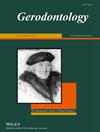Food insecurity and its relationship to mental health and oral health in older adults
Abstract
Background and objectives
Poor oral health disproportionately affects low-income older adults, for whom food insecurity and poor mental health may affect dental health. We explored the associations between food insecurity, mental health, and dental health. Furthermore, we examined whether mental health impacted the associations between food insecurity and dental health.
Materials and Methods
We conducted a cross-sectional study with a convenience sample of 226 older adults (aged 50+), employing survey and dental screening data. Participants were recruited from seven community-based organisations in Washington State, USA. We calculated descriptive statistics and conducted Chi-square tests, t tests, and logistic regression analyses to assess the associations between aspects of dental health (untreated decay, gum disease, and unmet dental needs), mental health (depression and cognitive function), and food insecurity.
Results
In our sample, food insecurity was observed in 28.4%, 40.6% had untreated decay, 31.6% gum disease, and 42.5% unmet dental needs. Food insecurity was associated with a higher occurrence of untreated decay and unmet dental needs. Participants experiencing food insecurity had higher odds of gum disease (aOR = 2.3; 95% CI: 1.1, 5.2) and unmet dental needs (aOR = 3.2; 95% CI:1.4, 7.6). Greater gum disease due to food insecurity was observed among individuals with lower levels of cognitive impairment.
Conclusion
Food insecurity is associated with poorer oral health among older adults and cognitive function may modify this relationship. These findings underscore the importance of addressing both food insecurity and cognitive impairment as integral components of efforts to improve the oral health of older adults.

 求助内容:
求助内容: 应助结果提醒方式:
应助结果提醒方式:


